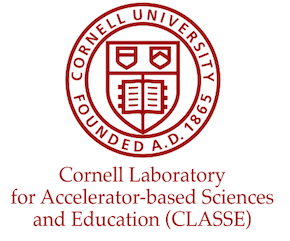You are here: CLASSE Wiki>Safety/Handbook Web>RadiationSafety>RadiationAreaCaveats (04 May 2012, bkh)Edit Attach
Technical Comment on Area Designations, Radiation Levels, & Exceptions to Policy
There are some semantic differences between Federal Nuclear Regulatory Commission area designations and those of Cornell EH&S (4.1.7, 5.1). In addition, CLASSE generally interprets the Cornell regulations in a conservative manner. Here we elaborate somewhat on these two issues. What Cornell and CLASSE call "controlled" and "uncontrolled", the NRC calls "restricted" and "unrestricted", respectively. The NRC definition of "controlled area" does not have a direct counterpart for Cornell and CLASSE. Generally at CLASSE, a set of strategically-placed radiation monitors are interlocked to shut down radiation-producing equipment if the instantaneous radiation field rises above 2 mrem/hr outside of exclusion areas. Cornell and CLASSE designate an exclusion area as one where access is prohibited when a radioactive source or radiation-producing equipment is in use; at CLASSE, we also generally implement a light-beam interlock system to enforce the perimeter. Immediately before an exclusion area is opened for general access, a radiation survey for residual radioactivity is performed and any locations which exceed 2 mrem/hr at 30 cm are conspicuously marked with the reading; locations above 100 mrem/hr at 30 cm are marked and roped off at a perimeter where the level is below a 2 mrem/hr. (Within the positron converter cave in LS1 the radiation field adjacent to the converter is assumed to exceed 100 mrem/hr and may not be posted. Access to this area is always limited to specific need.) CLASSE radiation safety policy will, at all times, conform with Cornell, NY State, and Federal standards and regulations. However, while the more conservative implementation at CLASSE, as described in this Handbook, will generally apply, exceptions may be granted in rare circumstances. For example, an individual might be allowed to remain inside the formal exclusion area perimeter when equipment is powered in order to accomplish something that cannot otherwise be done, such as surveying radiation fields (where it can be done safely). However, such exceptions may occur only with the express consent of the CLASSE Safety Director (or "acting" substitute) and one other knowledgeable person, typically, but not exclusively, the relevant radiation permit holder. Such exceptions will be recorded in the radiation log (including the dosimeter reading), and always remain in compliance with governmental and institutional rules and the spirit of ALARA.
Edit | Attach | Print version | History: r6 < r5 < r4 < r3 | Backlinks | View wiki text | Edit wiki text | More topic actions
Topic revision: r6 - 04 May 2012, bkh
-
 Safety/Handbook Web
Safety/Handbook Web
-
 Create New Topic
Create New Topic
-
 Index
Index
-
 Search
Search
-
 Changes
Changes
-
 Notifications
Notifications
-
 RSS Feed
RSS Feed
-
 Statistics
Statistics
-
 Preferences
Preferences
- Webs
-
 ACC
ACC
-
 ACL
ACL
-
 Bunch
Bunch
-
 Private
Private
-
 BusinessOffice
BusinessOffice
-
 CBB
CBB
-
 NSF
NSF
-
 CBETA
CBETA
-
 CESR
CESR
-
 Private
Private
-
 CHESS
CHESS
-
 FMB
FMB
-
 Maia
Maia
-
 XIMG
XIMG
-
 CHEXS
CHEXS
-
 CLASSE
CLASSE
-
 Inventory
Inventory
-
 Communications
Communications
-
 CLEO
CLEO
-
 AC
AC
-
 Administration
Administration
-
 RunMan
RunMan
-
 SW
SW
-
 CMSPhase2MREFC
CMSPhase2MREFC
-
 Computing
Computing
-
 Blogs
Blogs
-
 Newsletter
Newsletter
-
 Obsolete
Obsolete
-
 Cosmology
Cosmology
-
 Private
Private
-
 DarkPhoton
DarkPhoton
-
 ERL
ERL
-
 Private
Private
-
 EngineeringDesignDrafting
EngineeringDesignDrafting
-
 G2
G2
-
 HEP
HEP
-
 DBSWorkshop
DBSWorkshop
-
 SWIG
SWIG
-
 HLLHCCMSMREFC
HLLHCCMSMREFC
-
 HMF
HMF
-
 HumanResources
HumanResources
-
 Private
Private
-
 ILC
ILC
-
 Americas
Americas
-
 CesrTA
CesrTA
-
 Proposal
Proposal
-
 DampingRings
DampingRings
-
 AreaLeaders
AreaLeaders
-
 CTA09
CTA09
-
 ILCDR06
ILCDR06
-
 ILCDR07_KEK
ILCDR07_KEK
-
 ILCDR08
ILCDR08
-
 S3TaskForce
S3TaskForce
-
 Private
Private
-
 CesrTA
CesrTA
-
 WWS
WWS
-
 MacCHESS
MacCHESS
-
 Main
Main
-
 People
People
-
 PhotocathodeBrightBeams
PhotocathodeBrightBeams
-
 REU
REU
-
 Private
Private
-
 SRF
SRF
-
 PCsrfcn1
PCsrfcn1
-
 Safety
Safety
-
 Handbook
Handbook
-
 Private
Private
-
 ExternalResources
ExternalResources
-
 Sandbox
Sandbox
-
 TestWeb
TestWeb
-
 Testauth
Testauth
-
 System
System
-
 Theory
Theory
-
 Communications
Communications
-
 Documents
Documents
-
 Phase2MREFC
Phase2MREFC
-
 WebDev
WebDev
-
 Private
Private
-
 XLEAP
XLEAP
 Copyright © by the contributing authors. All material on this collaboration platform is the property of the contributing authors.
Copyright © by the contributing authors. All material on this collaboration platform is the property of the contributing authors. Ideas, requests, problems regarding CLASSE Wiki? Send feedback


